Speak About the Photo - Guide to Duolingo English Test Question (2025)
Speaking questions in general are difficult on the DET, but Speak About the Photo can be especially difficult because you have to describe an image in detail for 90 seconds.
But not to worry, because in this post, you will learn everything you need to do well on Speak About the Photo!

Table of Contents
- What is the Speak About the Photo question type?
- Tips to do well on the Speak About the Photo question type
- How to practice Speak About the Photo questions

What is the Speak About the Photo question type?
The Speak About the Photo question type looks like this:
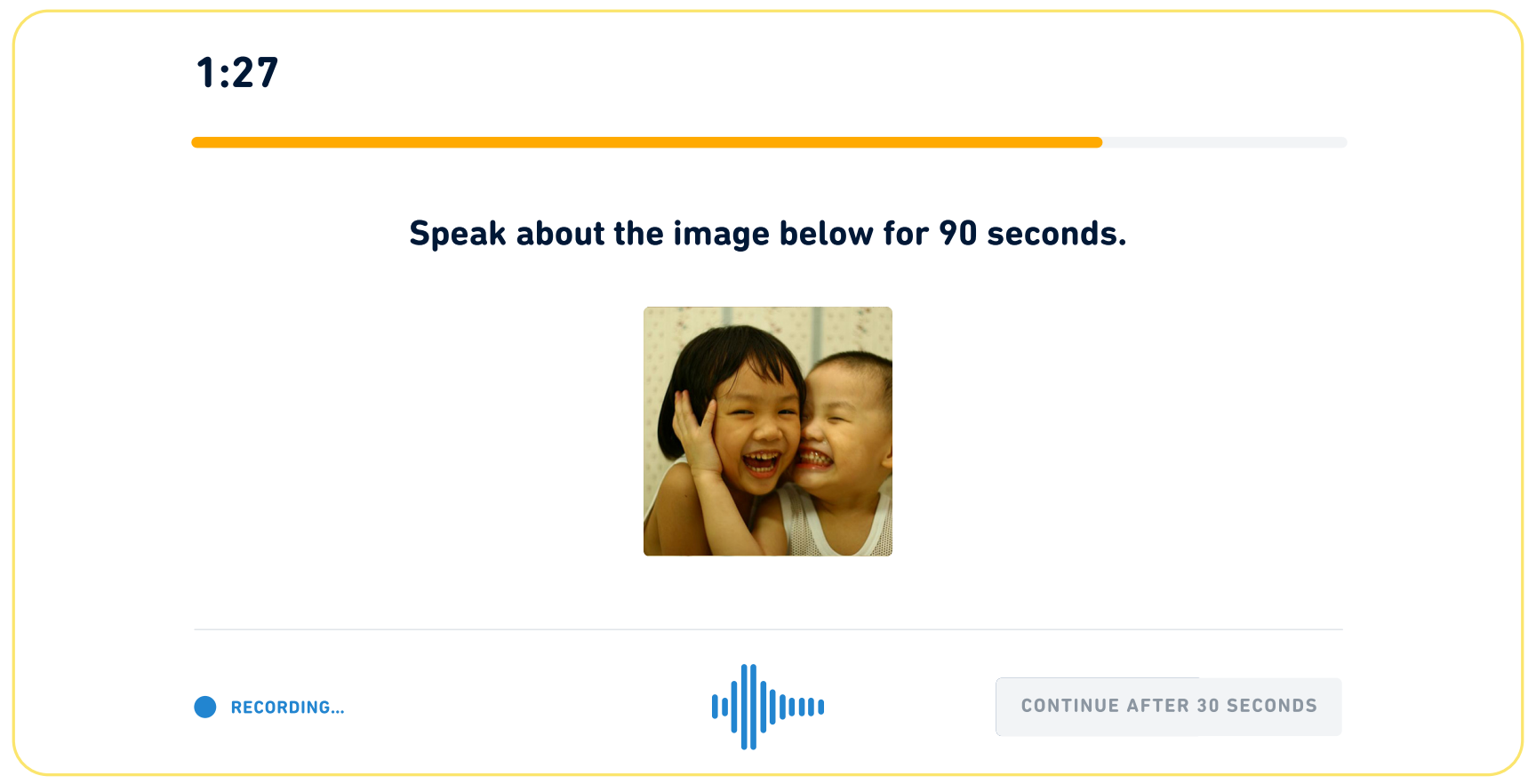
You are given 20 seconds to study the image. Then, you have 90 seconds to describe it. During that time, you will still be able to see the image.
You can only record yourself 1 time.
This question counts toward your Speaking, Conversation, and Production subscores, and it appears just 1 time on the test.
Tips to do well on the Speak About the Photo question type
These are the key tips for Speak About the Photo:
- Study the image carefully
- Use a strategy to structure your response
- Learn advanced vocabulary to describe images
- Don't stop if you make a mistake
- Speak for the entire 90 seconds
- Stay on topic
- Slow down and speak loudly and clearly
- Use a good microphone
- Take the test in a quiet place
Let's go deeper into each tip:
Study the image carefully
The image you are given is quite small. Be sure to study it carefully to notice all important details. That way, you have plenty to talk about in your response. This is why you are given 20 seconds before you have to speak.
Use a strategy to structure your response
A strategy makes it easier to have relevant, specific details in your description of an image. Moreover, when you know what aspects of an image to describe, you can focus on finding the right words and using correct grammar.
In the lesson below, you can learn our Speak About the Photo template:
We speak faster than we write and Speak About the Photo is 90 seconds, so this means that your Speak About the Photo response should be 3-4 times longer than your Write About the Photo responses. To accomplish this, you will need to describe more details in your Speak About the Photo response.
Let's compare a Write About the Photo description and a Speak About the Photo description of the same image to see what I mean:

Write About the Photo
This image depicts a cat perched on top of a door. The cat seems a bit young, and it looks slightly frightened. Perhaps because the cat is young and curious, it climbed up there, but now it is unsure how to get down so it is scared.
Speak About the Photo
This image depicts a cat perched on top of a door. It's not possible to say what color fur the cat has because the photo is black and white. The cat seems a bit young, and it looks slightly frightened. Perhaps because the cat is young and curious, it climbed up there, but now it is unsure how to get down so it is scared. Alternatively, it could be the case that someone placed the cat up there in order to capture an interesting picture, but I hope not because that would be cruel. The cat seems to be focused on something out of the frame. Another possibility is that the cat is hunting another animal, like a bird or a mouse, and it climbed up on the door in its pursuit. The room where the photo was taken seems quite plain. It has white walls and a white door, and there are no posters, pictures, or any kind of decorations on the walls.
In order to fill out my Speak About the Photo response, I describe more details and I speculate more. "Speculating" is when we talk about why things are they way they are, and it's a really useful strategy for Speak About the Photo. Learn more about it here:
Learn advanced vocabulary to describe images
Each image is different, but there is high-scoring vocab that is useful across images. For example, you can learn vocab to describe the location and colors and things in images. On our YouTube channel, we have a bunch of videos that teach you useful vocab for picture description, and you can find them in this playlist. We also have free PDF print outs with useful vocab.
Don’t stop if you make a mistake
If you make a mistake, don't panic – just keep speaking. You can still get a high score even if you have a few mistakes in your response. But if you stop and your response isn't detailed enough, it will be impossible to get a high score.
Speak for the entire 90 seconds
By speaking for the entire time, which you should do on all speaking questions, you will ensure that your response is full and detailed, which will help you get a higher score. It's important to practice speaking the entire time while preparing for the DET so that you have the right habits on test day.
Stay on topic
Although you should aim to speak for the full 90 seconds, you don't want to put irrelevant information in your response just to speak for longer. One of the scoring criteria for the Duolingo English Test is “task relevance.” If your response is not relevant enough to the image, you will lose points.
Take this image for example:

If you describe how the image reminds of you of the close bond you have with your brother or sister, that's fine because it's relevant to the photo. But if you describe what you had for lunch, that is bad because it has nothing to do with the photo!
Slow down and speak loudly and clearly
You want your voice to be easy to understand in the recording. To help with that, be sure to speak loudly and clearly. You should speak more loudly than you normally would in a video call. Pretend like you are speaking to someone across the room, not someone sitting across the table from you.
Also focus on speaking clearly. Slowing down will help you do this because it will give you time to pronounce each part of each word clearly. Duolingo makes it clear that all accents of English are acceptable, as long as it is easy to understand the words you are saying.
A useful trick to help you speak slowly, clearly, and loudly is to speak from your belly. If you place your hand on your belly button, you should feel your hand move forwards and backwards as you speak. If you don't, that means that you are tense and speaking from your throat, which will negatively impact your speech.
Use a good microphone
If your microphone is bad, it will be difficult to understand you in your recording, and you could get a lower score. If your microphone isn’t good, ask to borrow a computer or laptop from someone else that has a better one.
Take the test in a quiet place
If there is background noise, it will be harder to hear you. If there is too much background noise – especially if there are other voices – Duolingo may suspect that you weren't alone while taking the test and they won't certify your results.
How to practice Speak About the Photo questions
Speaking is the hardest thing to practice, because it usually requires that you have a speaking partner, and ideally your partner speaks English well and can give you feedback. However, with Arno you can get instant feedback on your speaking – no tutor or speaking partner needed! It’s very cool 😎
Here's how it works:
Arno's practice questions look just like questions from the real DET:
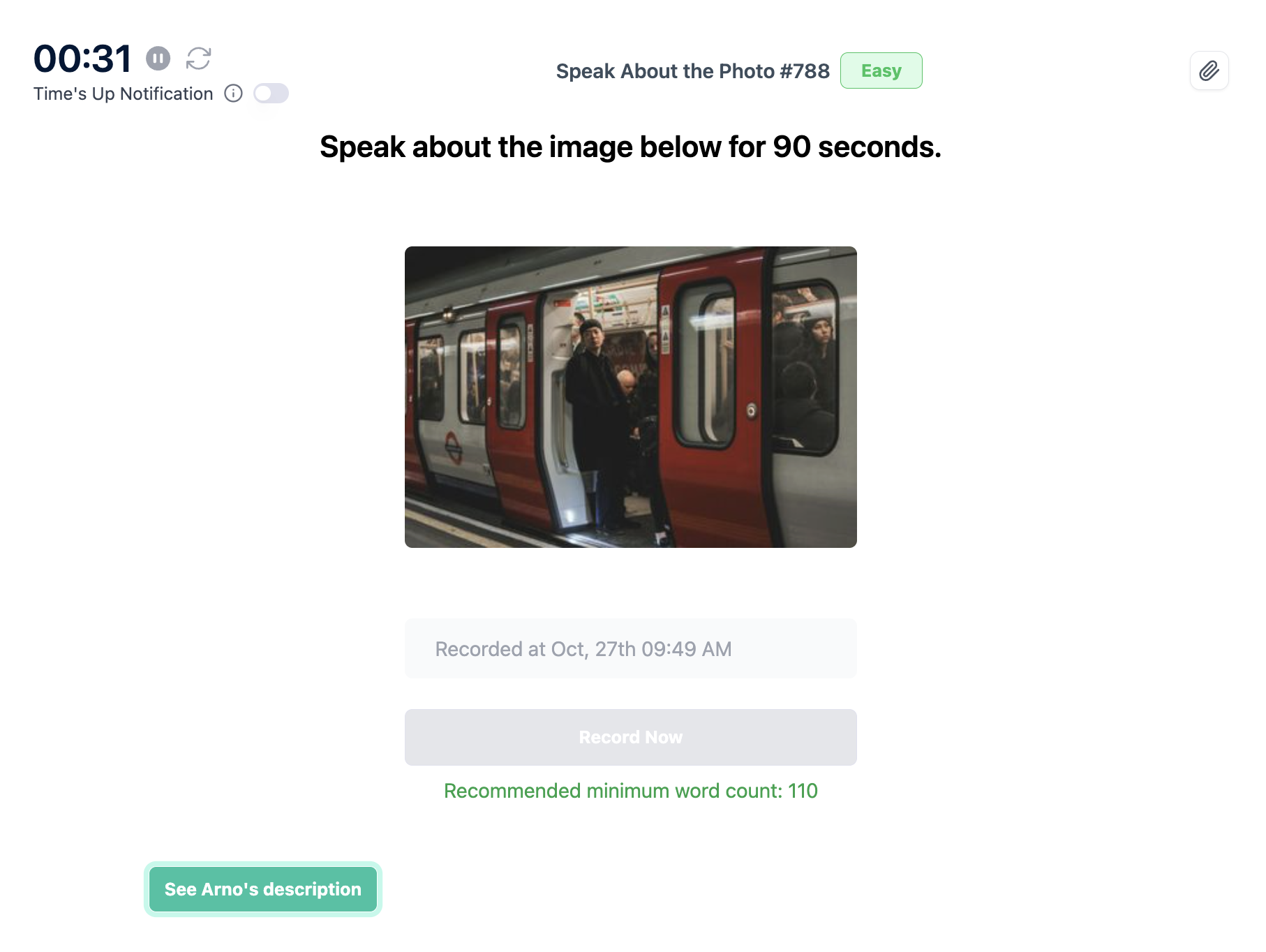
After you submit your answer, you will see a transcript of your response – which you can also listen to – as well as your score:
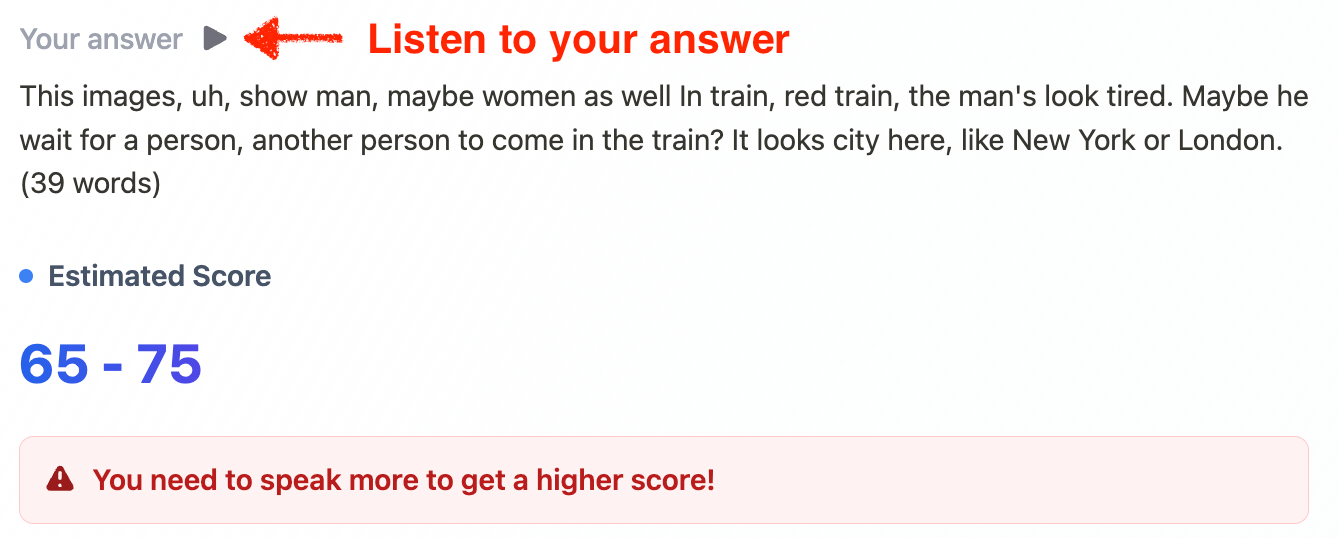
Arno also details the strengths and weaknesses of your response:
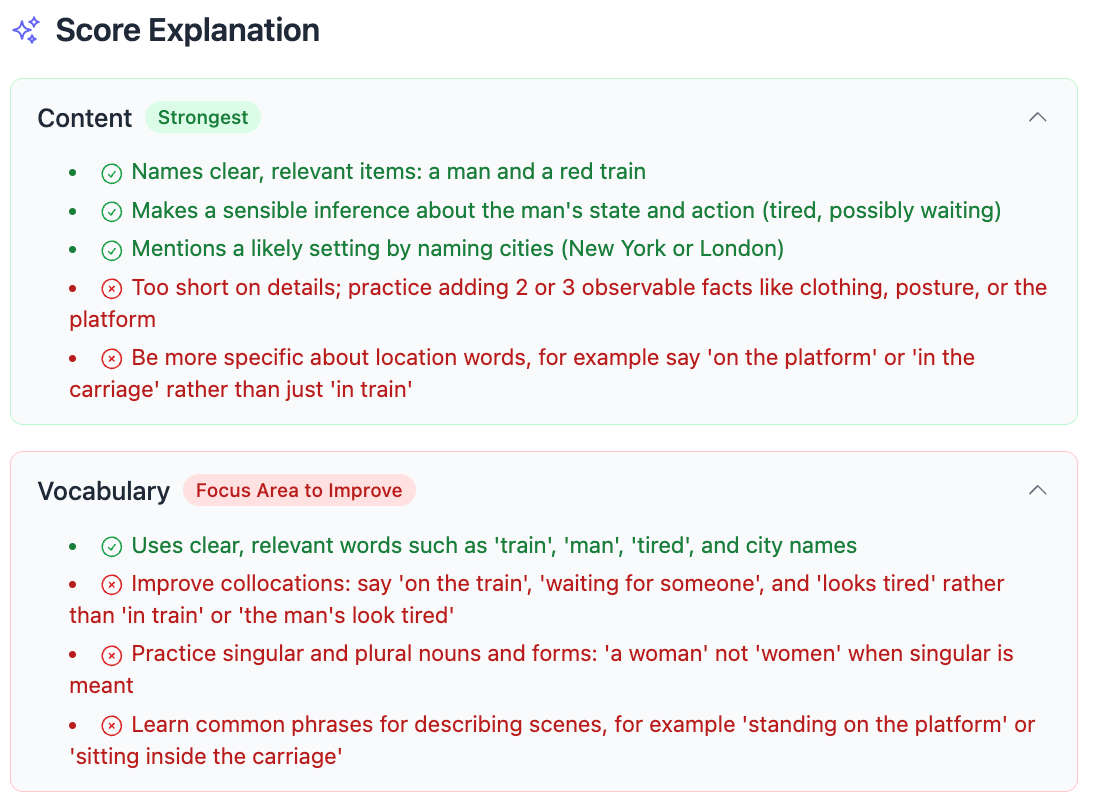
Arno's Grammar Tutor will also help you fix your grammar so that you can learn from your mistakes:
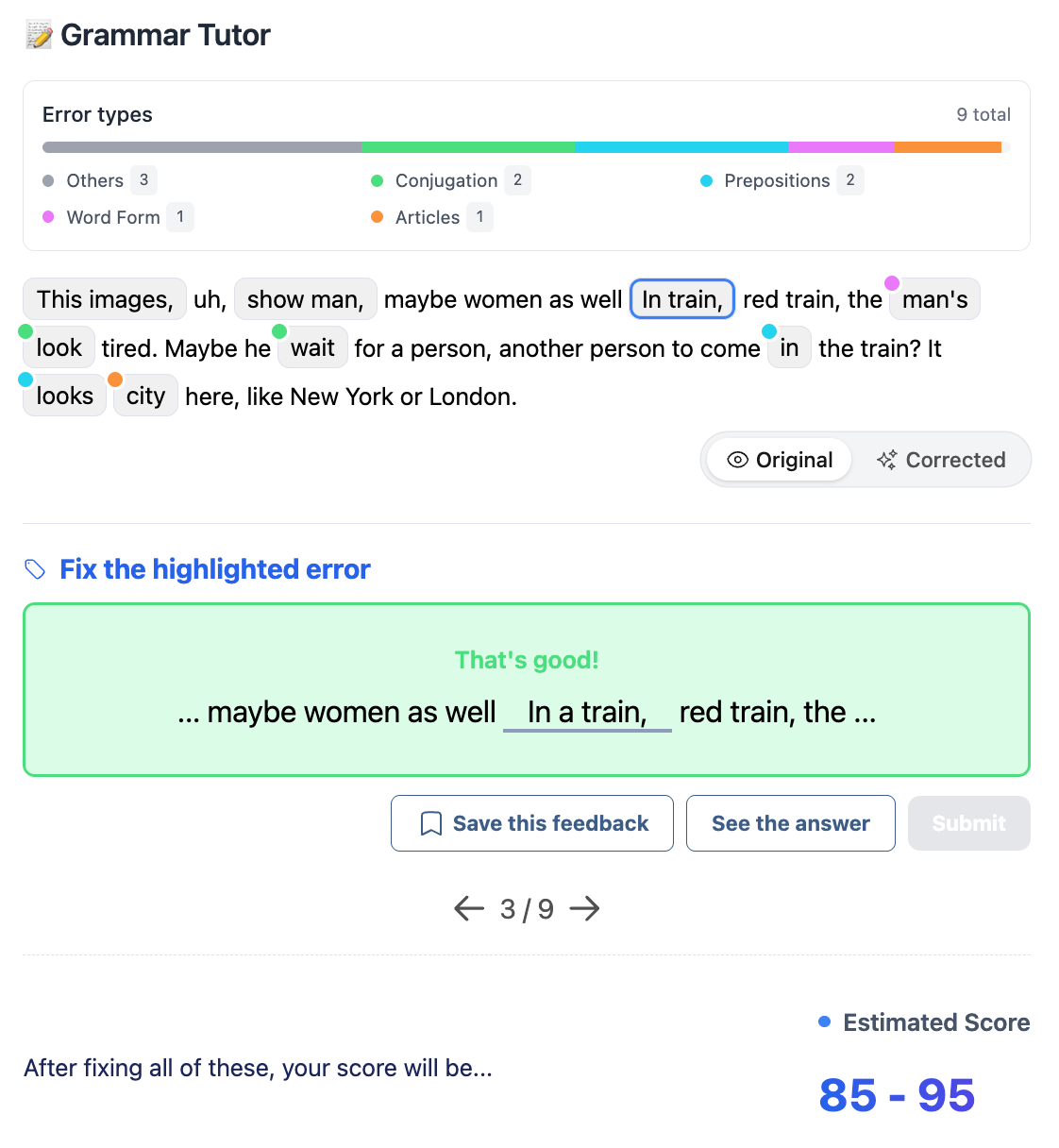
Arno will also rewrite your response to use better phrasing and vocabulary:
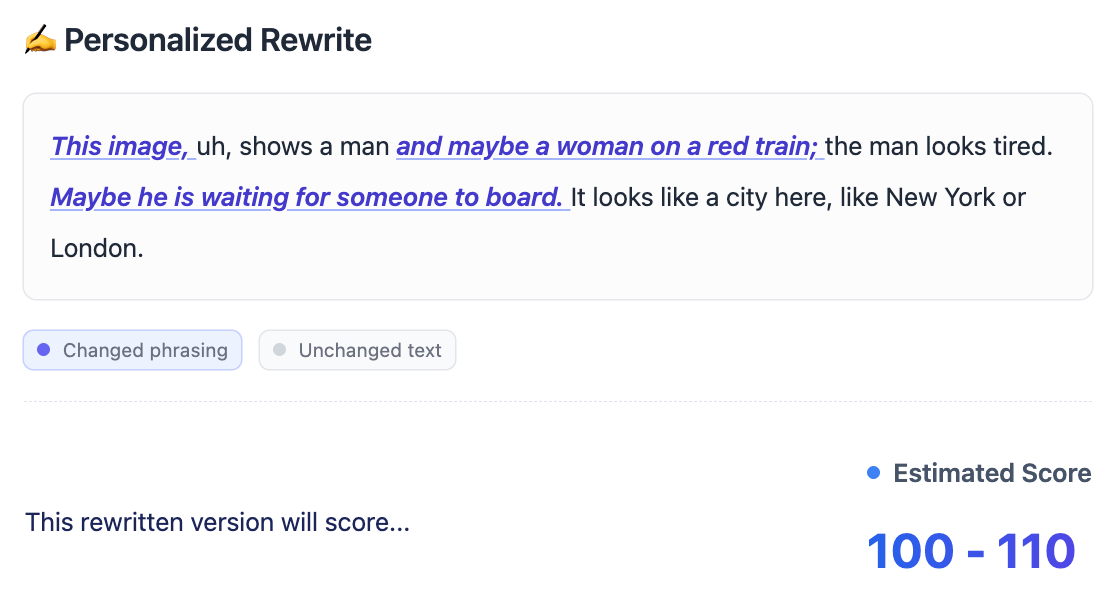
Every new Arno user can get feedback like this on 5 of their responses, and a full mock test with feedback like this on all their responses! To check it out for yourself, just click below to create your free account:

With that, you have a solid foundation for Speak About the Photo. Now, it's time to practice with everything you learned!